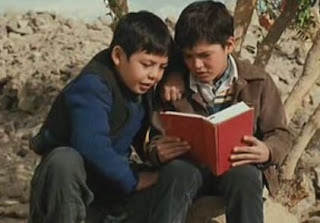Benefits of Reading Kite Runner for Indonesian Readers
Hello, we are back! We are sure all of you could not wait for us to post this topic. Some of you might have asked, "This is a novel from Afghanistan, there is no values of Indonesia here." Oh, but it is not exactly right, Kite Runner also has some benefits for Indonesian readers. You can start reading to find out ;)
Our beloved country Indonesia is a massive country with
variety of races, religion, and culture. Unity is very important and needed in
controlling this country. The novel Kite Runner, also having racial, religious
and cultural issues in the story plot, which in our opinion is a perfect book
to be read by Indonesian, due to its similarity in terms of issues.
"They called him "flat-nosed" because of Ali and Hassan's characteristic Hazara Mongoloid features. For years, that was all I knew about the Hazaras, that they were Mogul descendants, and that they looked a little like Chinese people. School text books barely mentioned them and referred to their ancestry only in passing. Then one day, I was in Baba's study, looking through his stuff, when I found one of my mother's old history books. It was written by an Iranian named Khorami. I blew the dust off it, sneaked it into bed with me that night, and was stunned to find an entire chapter on Hazara history. An entire chapter dedicated to Hassan's people! In it, I read that my people, the Pashtuns, had persecuted and oppressed the Hazaras. It said the Hazaras had tried to rise against the Pashtuns in the nineteenth century, but the Pashtuns had "quelled them with unspeakable violence." The book said that my people had killed the Hazaras, driven them from their lands, burned their homes, and sold their women. The book said part of the reason Pashtuns had oppressed the Hazaras was that Pashtuns were Sunni Muslims, while Hazaras were Shi'a. The book said a lot of things I didn't know, things my teachers hadn't mentioned. Things Baba hadn't mentioned either. It also said some things I did know, like that people called Hazaras mice-eating, flat-nosed, load-carrying donkeys. I had heard some of the kids in the neighborhood yell those names to Hassan." (2.23)
Those quotation from “The Kite Runner” above have shown us that racial issues also happen in the other part of the world, not just in Indonesia. Being the minority like the Hazaras means they have no right at all, which show us no humanity at all. The fact is, every people is equal, means there should be equality among human being. This one told Indonesian reader that equality is very important and they should not put it aside. “Bhinneka Tunggal Ika” the national identity of Indonesia, which mean ignoring the difference but unite as a nation. Amir and Hassan is the perfect role model of the unity of a nation, Javanese, Chinese, Sundanese, Maduranese, some of those main ethnic group consisting the Indonesian, should live in harmony, by being like Amir and Hassan.
There was a plot in the story when Amir do nothing when he
saw Hassan got raped, this experience always give him the feeling of guilty
everytime he saw or even just thought about Hassan. Amir always thought that
there is no way he could redeem this “sin”, until Hassan died and left his son
alone in Kabul. To make him feel better, Amir save Sohrab, Hassna's son, with
much risk to face, this is the way he chose to redeem his “sin” toward Hassan
past years ago. In this case, just assume the “sin” Amir did is the past
tragedy in Indonesia (for example 12th May Tragedy), and Indonesia as Amir,
there is always a way to redeem your “sin”. The writer, indirectly thought
us from the story about how , Indonesian, that there is a way to redeem our
“sin” in the past toward other ethnic, religion and culture. In our opinion,
Redeem of Indonesian can be achieved by various way, such as not calling other
ethnic with certain name, act the same toward all races in Indonesia, and every
positive act you can think about toward others. The risks I meant in this
parable, is the risk of facing your inner thought, being brave enough as a
“man” who can stand up and control your own perspective toward other races with
equality.
The Kite Runner had actually thought many life lesson,
especially to Indonesian who live in different races and religions.
Differentiating races, religion, and culture won’t give any positive effect in
life, but actually give conflict, troubles, and other negative vibes as the
result. We, Indonesian, should act like a “man” who can stand up against those
difference and accept equality among human as our life value. We shared a same
history, a same fight in taking our rights from the colonialist back then. This
history made us family. We fought together, we fell together, we stood up
together. So why now we look at each other with "you are different with
me" looks? Why do we try to take each other down just for our own benefits?
The novel clearly told us to help each other. To give our
hands for those who needs it, no matter what is their religion or their race.
We are HUMANS. We ate the same food, we stood on the same ground.
References:
Hoesseini, Khaled. 2004. The Kite Runner. New York: Riverhead
(unknown) http://www.academia.edu/4174946/The_Kite_Runner_Who_is_courageus_enough_to_run_with_i
tunknown (2008) http://ucsdmag.ucsd.edu/magazine/vol5no1/features/kiterunner.htmReferences:









